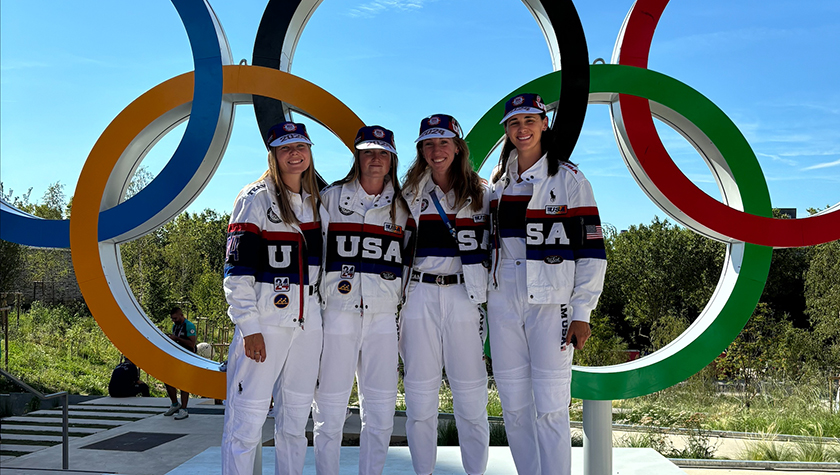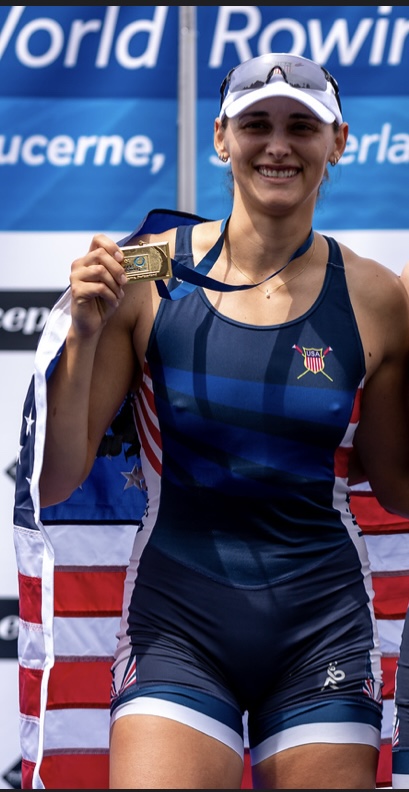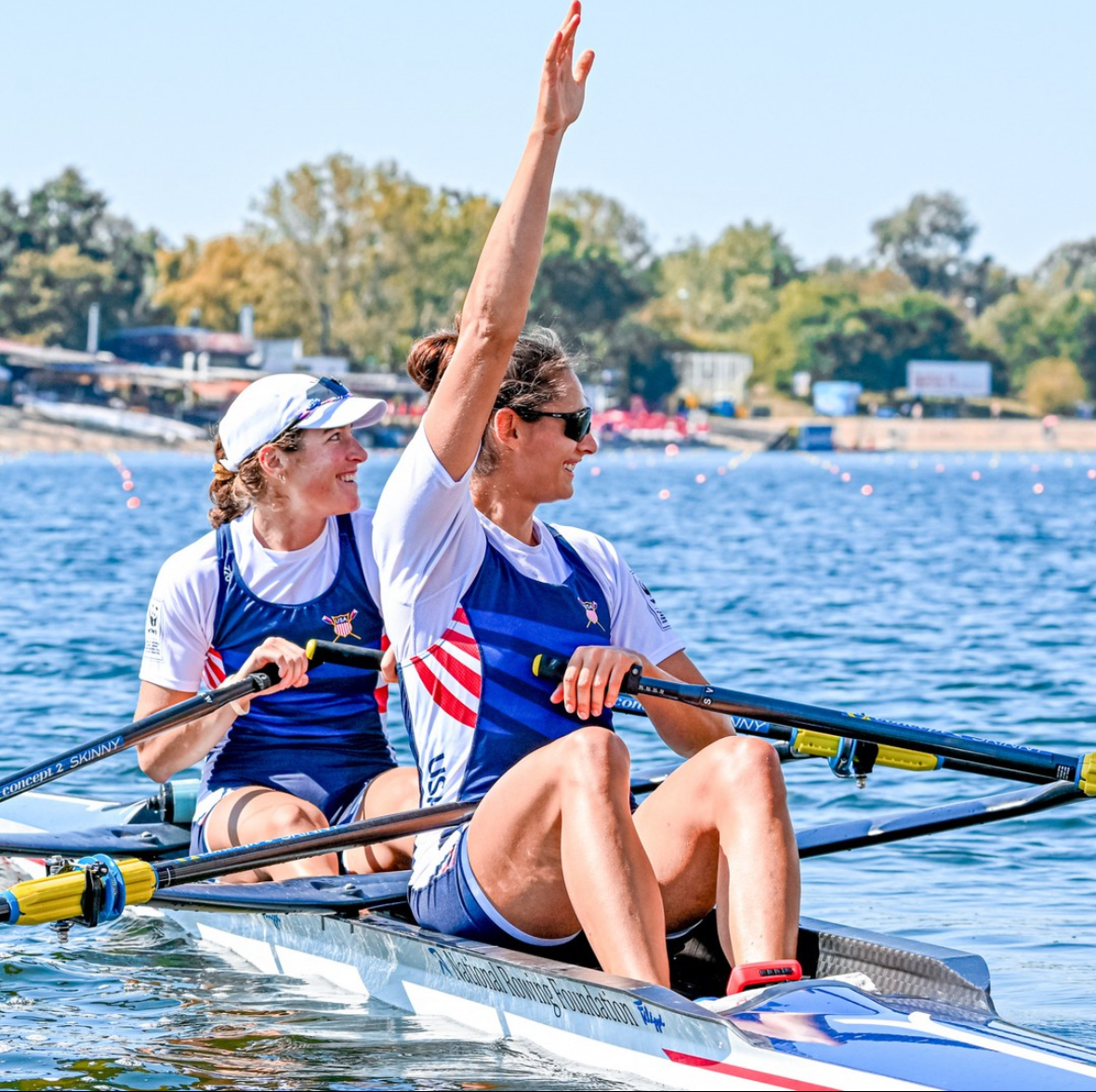
PharmD student Sophia Vitas, 2024 Olympian, pursues a pharmacy career as an elite athlete
By Logan Underwood
Sophia Vitas had no rowing experience when she first stepped onto the boat with the University of Wisconsin–Madison rowing team. Vitas, an undergraduate student at the time, remembers seeing the Big 10 Rowing Championship playing on the television at her gym. Intrigued by their skill, technique, and strength, Vitas went to the team’s open try-outs and took to the sport quickly.
“The work you put in is what you get out of it, so that was what drew me to it,” she says. “I can see the progress, day in and day out.”
Today, nearly a decade later, life looks quite different for Vitas: She’s starting her first year of the PharmD program at the University of Wisconsin–Madison as a 2024 Olympian.
Earlier this year, she headed to Paris to represent the United States in the women’s double sculls event, in which two rowers each use two oars to propel a small, narrow boat — called a scull — forward.
“The work you put in is what you get out of it, so that was what drew me to it. I can see the progress, day in and day out.”
—Sophia Vitas
By the time she competed in Paris — where her team ranked ninth globally — Vitas had competed in several international competitions, winning a gold medal at World Rowing Cup II in 2024, a bronze medal in the 2023 World Championships, second place in double sculls in the 2023 World Rowing Cup II, and third place in the 2022 World Rowing Cup II for the same event.
“The UW–Madison team did a pretty good job of bringing me into it,” Vitas says. “Like getting me used to the motions, what the seasons look like, and what competing in a boat feels like.”
Charting a path

When Vitas first joined the UW rowing team, she had no aspirations of turning the sport into a career or competing internationally. But Vitas was a natural, and, coupled with her hard work and dedication, she quickly excelled and became a Division 1 athlete for the next two years, until she graduated in 2016 with a bachelor’s degree in chemistry.
“I’ve always loved chemistry and science,” says Vitas. She envisions using these skills to improve medication usage.
“I was seeing a lot of overprescribing and medication mismanagement with some family members, and those situations made me aware of how important the role of a pharmacist is in the healthcare system,” says Vitas. “I knew I wanted to be involved in medicine, and pharmacy is a good way to combine that interest with my love of chemistry.”
Despite having her prerequisites completed for pharmacy school, Vitas felt pulled in another direction.
“I felt like I was getting pretty good at rowing, and it was fun, and I wanted to see where it would take me,” she says. “After graduation, I started training full-time, and as I was training, I knew that pharmacy school was still on my radar.”
Olympic journey
As she got further into training, Vitas gravitated toward sculling, and away from sweeping, as she did at the UW. In sweep rowing, each rower has a single oar, held with both hands, and is usually on a larger boat with more rowers. Sculling, on the other hand, puts less focus on strength and more emphasis on technique and coordination between a few teammates. Vitas likes that sculling gives her more control over her boat and pushes her to find synchronicity and rhythm with a partner.
“I’m very much in control of what I’m doing, so when something goes wrong I can only blame myself,” Vitas says. “It has that accountability factor, and I think that made me a much better athlete.”
Soon, Vitas was competing on a global stage, earning medals and taking top places in international races. Vitas hoped to qualify for the 2020 Olympics in Tokyo, but a rib fracture just before selections took her out of the running.

As the Paris Olympics were approaching Vitas again began training full time and made the cut. She found out in spring of 2024 that she would represent the U.S. in Paris, placed in the double sculls event with Kristina Wagner, a partner with whom Vitas has been rowing since 2022.
Before she knew it, Vitas was thrust into a dining hall with the biggest athletes from across the globe. She was sharing training spaces and meals with elite competitors from all different countries and sports.
“Everyone was on a level playing field, and you’re able to just connect with them as humans beyond what you saw on TV,” Vitas says.
It was an exciting opportunity for Vitas, but it’s just one in a constellation of achievements stemming from her dedication to rowing.
“It’s just a snapshot,” Vitas says. “I consider all of my races equally important, from inter-squad racing at practices, to World Cups and World Championships, and the Olympics. I value all of those experiences and try to learn from my success and failures.”
From the Olympic stage to lecture halls
While preparing for the Paris Olympics, Vitas was also preparing for her return to UW–Madison and the start of her pharmacy school journey.
During her years of rowing, Vitas’ pharmacy school prerequisites, completed as an undergraduate, started to expire. But her Olympic endeavors kept her connected to her future career.
“Thankfully, the Olympic Committee is able to grant tuition awards, so I was able to apply that money to keep up with my prereqs alongside training full time and competing on a world stage,” she says. She started that process in 2020, when she narrowly missed the Tokyo Olympics.
This September, Vitas started classes in her first semester at the UW–Madison School of Pharmacy, and the switch from intense daily practices to sitting in a lecture hall proved to be jarring. But Vitas is using the skills she’s gained in competitions to transition into the School of Pharmacy.
“Training at the elite level, you can’t leave any stone unturned in terms of your preparations and focusing on what you can control. The same fundamentals apply in pharmacy.”
—Sophia Vitas
“It’s easy for me to be disciplined about schedules and studying, because when I was rowing my entire day, I had to segment out time for training, recovery, physical therapy, and meal planning,” she says. “The time management and knowing where to prioritize my energy has been very useful.”
Although she’s unsure of where in the pharmacy world she wants to end up, Vitas is finding that the same attention to detail and focus she uses in rowing — which she still practices for a few hours each day — are prevalent in any pharmacy career.
“I see a lot of overlap,” says Vitas. “Training at the elite level, you can’t leave any stone unturned in terms of your preparations and focusing on what you can control. The same fundamentals apply in pharmacy.”
